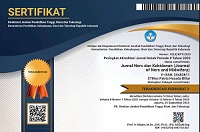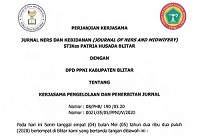Edukasi Berpengaruh terhadap Pemberian Stimulasi Perkembangan Anak Usia 12-24 Bulan oleh Ibu di Posyandu Desa Tambakrejo Kabupaten Puworejo
DOI:
https://doi.org/10.26699/jnk.v7i2.ART.p231-238Keywords:
Anak Balita, Edukasi, Perkembangan, StimulasiAbstract
Pemberian stimulasi merupakan hal penting yang dibutuhan anak dalam masa pertumbuhan dan perkembangannya. Pemantauan pertumbuhan dan perkembangan anak yang dilaksanakan secara tepat dan terarah menjamin tumbuh kembang anak lebih optimal yang menjadikan anak berkualitas, cerdas, bertanggung jawab dan berdaya guna bagi nusa dan bangsa. Tujuan penelitian ini adalah melihat pengaruh edukasi terhadap pemberian stimulasi pada anak usia 12-24 bulan oleh ibu. Penelitian ini menggunakan quasi eksperimen dengan non-equivalent control group design. Sampel penelitian adalah ibu yang memiliki balita usia 12-24 bulan di Posyandu Desa Tambakrejo dengan jumlah sampel 20 responden untuk masing-masing kelompok intervensi dan kelompok kontrol. Instrumen dalam penelitian ini menggunakan SAP dan booklet untuk panduan pemberian edukasi stimulasi dan kuesioner terstruktur untuk data pemberian stimulasi oleh ibu. Analisis menggunakan uji Independen T-Test. Hasil penelitian ini menyatakan bahwa terdapat perbedaan yang signifikan pada perilaku pemberian stimulasi sebelum dan setelah diberikan intervensi edukasi stimulasi pada ibu. Peran kader berpengaruh terhadap pemberian stimulasi oleh ibu kepada anak, sehingga perlu pembinaan untuk kader tentang pemberian stimulasi perkembangan anak yang baik dan terarah melalui pelatihan-pelatihan.
Â
Provision of stimulation is an important thing that is needed by children in their growth and development. Monitoring the growth and development of children carried out correctly and directed to ensure the development of children is more optimal that makes children of quality, intelligent, responsible and efficient for the homeland and the nation. The purpose of this study is to look at the effect of education on the provision of stimulation in children aged 12-24 months by mothers. This research method uses quasi-experimental with non-equivalent control group design. The study sample was mothers who have children aged 12-24 months in Posyandu Tambakrejo Village with a sample of 20 respondents for each intervention and control groups. The instruments in this study used SAP, booklet and structured questionnaires. The analysis uses the Independent T-Test. The results of this study stated that there were significant differences in the behavior of stimulation before and after the stimulation education intervention was given to the mother. The role of cadres influences the provision of stimulation by the mother to the child, so there is a need for coaching for cadres about providing stimulation of good and directed through training.
References
Albers, E. M., Riksen-Walraven, J. M. & de Weerth, C. (2010) Developmental stimulation in child care centers contributes to young infants’ cognitive development. Infant Behavior and Development, 33(4): 401-408.
Barros, A. J. D., Matijasevich, A., Santos, I. S. & Halpern, R. (2010) Child Development in a birth cohort: Effect of Child Stimulastion is Stronger in Less Educated Mothers. Internastional Journal Epidemiology, 39(4): 285.
Dariyo, A. (2007) Psikologi Perkembangan Anak Tiga Tahun Pertama, Bandung: Refika Aditama.
Depkes (2008) Deteksi Dini dan Skrining Tumbuh Kembang Balita, Jakarta:Depkes RI.
Dinas Kesehatan Kabupaten Purworejo (2011) Profil Kesehatan kabupaten Purworejo.
Ertem, I. O., Dogan, D. G., Bayhan, A., Bingoler, B. E., Gok, C. G., Ozbas, S., Haznedaroglu, D. & Isikli, S. (2007) Moher's knowledgeof young child development in a developing country. Journal Compilation.
Guttmann, A., To, T., Dick, P. T., Rosenfield, Parkin, P. C., Tassoudji, M., Vydykhan, T. N., Cao, H. & Harris, J. K. (2004) Risk Markers for Poor Development Attainment in Young Children. Arch Pediatr Adolesc Med, 158(643): 49.
Hastuti, D., Alfiasari, Chandriyani. (2010). Nilai Anak, Stimulasi Psikososial dan Perkembangan Kognitif Anak Usia 2-5 Tahun pada Kleuarga Rawan Pangan di Kabupaten Banjarnegara Jawa Tengah. Jur. Ilm. Kel. & Kon., Januari 2010.
Huang, K., Caughty, M. O., Genevro, J. L. & Miller, T. L. (2005) Maternal Knowledge of Child Development and Quality of Parenting among White, African-American and Hispanic Mothers.
Kerlinger, F. N. (2003) Asas-Asas Penelitian Behavioral Yogyakarta:Gadjah Mada University Press.
Lemeshow, S., Hosmer, D. W., Klar, J. & Lwanga, S. K. (1997) Besar sampel dalam penelitian kesehatan. Yogyakarta: Gajah Mada University.
Meylina, E. (2000) Studi Tentang Pola Pengasuhan Anak, Status Gizi, dan Perkembangan Anak Baduta di Desa CIbatok 2, Kecamatan Cibungbulang, Kabupaten Bogor. IPB.
National Institute of Child Health & Human Development Early Child Care Research Network (2000) The Relation of Child Care to Cognitive and Language Development. Child Development, 71(4): 960-980.
Notoatmodjo, S. (2012) Promosi Kesehatan dan Perilaku Kesehatan, Jakarta:Rineka Cipta.
Ram, B. (2004) The effect of early maternal employment on children's cognitive outcomes: The Canadian experience. the annual meeting of the population association of America.
Rusmil, K. (2012) Pedoman Pelaksanaan, Deteksi dan Intervensi Dini Tumbuh Kembang Anak di Tingkat Pelayanan Dasar. Jakarta: Kementerian Kesehatan RI.
Sacker, A., Quigely, M. & Kelly, Y. J. (2006) Breastfeeding and Developmental Delay: Findings from the millenium cohort study. Pediatrics, 118e682.
Santrock, J. W. (2002) Life Span Development: Perkembangan Masa Hidup, Jakarta:Erlangga.
Santrock, J. W. (2002) Life Span Development: Perkembangan Masa Hidup, Jakarta:Erlangga.
Soetjiningsih, Ranuh, I. N. & Wahab, A. (2014) Tumbuh Kembang Anak Edisi 2, Jakarta:EGC.
Susanti, I. Y. (2014) Pengaruh Edukasi pada Ibu terhadap Pemberian Stimulasi Tumbuh Kembang pada Anak Balita di Kota Mojokerto. Program Studi Ilmu Kesehatan Masyarakat, Universitas Gadjah Mada.
Walker, S. P., Chang, S. M., Powell, C. A. & Grantham-McGregor, S. M. (2005) Effects of early childhood psychosocial stimulation and nutritional supplementation on cognition and education in growth-stunted Jamaican children: prospective cohort study. The Lancet, 366(9499): 1804-1807.
Walker, S. P., Wachs, T. D., Meeks Gardner, J., Lozoff, B., Wasserman, G. A., Pollitt, E. & Carter, J. A. (2007) Child development: risk factors for adverse outcomes in developing countries. The Lancet, 369(9556): 145-157.
Downloads
Published
How to Cite
Issue
Section
License
Copyright (c) 2020 Jurnal Ners dan Kebidanan (Journal of Ners and Midwifery)

This work is licensed under a Creative Commons Attribution-ShareAlike 4.0 International License.






